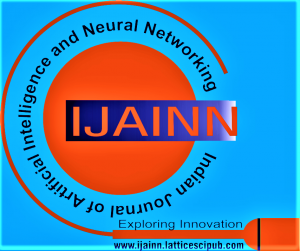![]()
Attitude Towards Artificial Intelligence and Tech Anxiety Among Working Professionals in Metropolitan Cities
Agna M Preeth1, Vigraanth Bapu K.G2
1Agna M Preeth, Student, Department of Psychology, Kristu Jayanti College, Bangalore (Karnataka), India.
2Vigraanth Bapu K.G, Assistant Professor, Department of Psychology, Kristu Jayanti College, Bangalore (Karnataka), India.
Manuscript received on 09 April 2024 | Revised Manuscript received on 21 April 2024 | Manuscript Accepted on 15 June 2024 | Manuscript published on 30 June 2024 | PP: 1-6 | Volume-4 Issue-4, June 2024 | Retrieval Number: 100.1/ijainn.D108904040624 | DOI: 10.54105/ijainn.D1089.04040624
Open Access | Editorial and Publishing Policies | Cite | Zenodo | OJS | Indexing and Abstracting
© The Authors. Published by Lattice Science Publication (LSP). This is an open access article under the CC-BY-NC-ND license (http://creativecommons.org/licenses/by-nc-nd/4.0/)
Abstract: Our attitudes towards Artificial Intelligence (AI) and our worries about technology are more relevant than ever in the modern world. Professionals in urban areas are at the forefront of the technological transition as AI technologies are progressively incorporated into various facets of professional life, from AI-driven decision-making tools to automated processes. This study investigated the relationship between attitudes towards Artificial Intelligence (AI) and Tech Anxiety among urban millennials. A quantitative research method was employed, utilizing the General Attitude Towards Artificial Intelligence Scale and the Attitude to Abbreviated Technology Anxiety Scale. A sample of 150 responses, predominantly from IT professionals and educators in metropolitan areas, was collected and analyzed. The findings revealed that there was no significant relationship between positive and negative attitudes towards AI and Tech Anxiety among urban millennials. Additionally, no significant differences were found in attitudes towards AI and Tech Anxiety based on profession and age. An interesting observation was made regarding age groups within the urban millennial demographic. While there was no significant difference in attitudes towards AI and Tech Anxiety between younger (25 to 30 years old) and older (31 to 35 years old) participants, it was noted that Tech Anxiety levels were slightly higher among individuals aged between 31 to 35 than 25-30.
Keywords: Attitude Towards Artificial Intelligence, Tech Anxiety, Urban Millenials, Working Professionals, Metropolitian Cities.
Scope of the Article: Intelligence Applications
